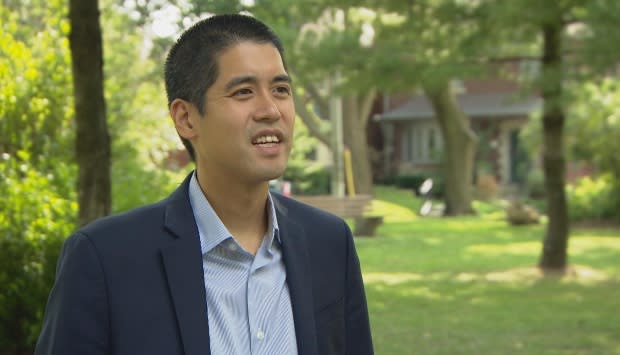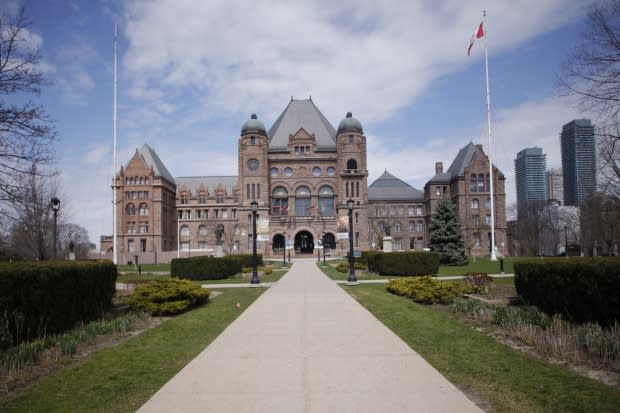Resurgence of COVID-19 in Ontario ups pressure on Doug Ford government

Ontario's COVID-19 cases are rising at a rate not seen for months, upping the pressure on Premier Doug Ford's government and public health officials to take fresh action to slow the spread of the coronavirus.
The average number of new COVID-19 infections confirmed daily in the province has doubled in a stretch of just three weeks. Ontario's daily count has exceeded 200 on each of the past three days, something that hasn't happened since early June.
On Monday, the province reported 313 new cases of COVID-19, representing a more than 50 per cent increase from the day before.
The trend is worrisome, said Dr. Isaac Bogoch, an infectious disease specialist at Toronto General Hospital, in an interview with CBC News
"I thought that we were going to see this rise in cases a little bit later," Bogoch said Sunday. "But it's real and it's happening now and it certainly is concerning. We certainly want to make sure that this doesn't continue to grow."
WATCH | Dr. Isaac Bogoch on the upward trend in COVID-19 cases:
On Friday, during his most recent news conference, Ford described the trend as an "uptick" limited to the most densely populated urban areas of Ontario.
"Where we are seeing an uptick is a couple regions," Ford said. "It's not the City of Toronto or the Peel Region's fault. This is happening, we've got to work together."
A senior provincial official told CBC News that there is "a growing sense of concern" in the government and among public health leaders over the rise in Ontario's COVID-19 numbers. If the trend continues, the official said the province would consider measures targeted at the specific locations and activities that are contributing to the infection rate.
Toronto, Ottawa and Peel Region, which includes the cities of Brampton and Mississauga, account for the bulk of the province's new cases.
Social gatherings, travel and workplace outbreaks appear to be driving the spread in Peel, said the region's medical officer of health, Dr. Lawrence Loh, in an interview with CBC News.
Last Monday, the province announced a four-week pause on any further relaxing of pandemic restrictions. Yet case numbers have since risen, even though classes have yet to resume for the roughly 500,000 students in the public and Catholic school boards of Toronto and Peel.
"So many Ontarians put so much work into into flattening the curve, into reducing the number of infections, it's really disconcerting to see those numbers go up," said New Democrat MPP Marit Stiles.
This surge in new cases — and the government's efforts to stop it from becoming the pandemic's second wave — are likely to dominate debate as MPPs return to Queen's Park following an eight-week break.

The provincial legislature sits Monday for the first time since July 21, giving opposition parties the chance to confront Ford and his ministers in question period.
Ford has put himself front-and-centre for Ontarians during the COVID-19 pandemic by holding a televised news conference nearly every single day over the past six months. His political approval ratings have soared, particularly after Ontario's daily number of new coronavirus cases receded from its peak in late April.
Advocating for a safe return to school will be central to the NDP's focus in the legislature, Stiles said.
"We think it's a critical component in ensuring that we weather this storm and that we don't see a really fast increase in infections," Stiles said in an interview with CBC News.
"There's a lack of confidence in the government's plan. Many parents do not feel that the schools are safe enough."
The province has required all boards to offer the option of remote schooling this fall and parents are choosing that route by the thousands. In the Toronto District School Board alone, some 60,000 students are opting for virtual classrooms, roughly one-quarter of the board's enrolment. A surge in demand for online learning from an extra 10,000 students in the past week forced the Peel District School Board to delay the start of its remote classes.

The government needs to make public a plan for preventing the feared "second wave" of COVID-19 infections, said Ontario Liberal Party Leader Steven Del Duca.
"Other provinces like British Columbia and Quebec have presented their versions of how they're prepared or are preparing for a potential second wave," Del Duca said in an interview.
"I think it would go a long way to helping provide Ontarians with peace of mind to know that Doug Ford has a similar plan and to see him share that with the people of Ontario."
The government will release a comprehensive preparedness plan in the coming weeks, said PC House Leader Paul Calandra.
"The cabinet and caucus have been working closely on this, learning the lessons of the first wave," Calandra said in an interview. "This plan will encompass all that we have learned ... to make sure that we are ready should the second wave hit."

The plan includes what will be the largest flu immunization campaign in Ontario's history and accelerated efforts to deal with the backlog of non-emergency surgeries.
Inside the legislature, measures to reduce the risk of spreading COVID-19 will be mixed.
For instance, there will be no crowds of reporters in the corridors shouting questions at ministers, known colloquially as scrums. Instead, those post-question-period sessions will take place in the Queen's Park media studio, which has become a familiar sight to Ontarians in recent months as the location of briefings by Ontario Chief Medical Officer of Health Dr. David Williams.
However, there is no limit on how many of Ontario's 124 MPPs can be in the legislative chamber at once, as there was back in the spring. The NDP has written to Speaker Ted Arnott expressing concern.
MPPs to wear masks
"Health experts and public officials, including the Premier, have emphasized the need to limit gatherings. MPPs should lead by example," said Peggy Sattler, the NDP's deputy leader, in the letter.
MPPs will wear masks when they are not addressing the legislature, Calandra said. "We will do our best to make sure that we continue physical distancing in the house," he said.
Under provincial law, the government must table a report to the legislature by Nov. 21 on the four-month-long state of emergency that was declared in response to the pandemic.
Finance Minister Rod Phillips's full budget for the 2020-21 fiscal year, which was deferred in March amid the arrival of the pandemic, is to be tabled in early November.
The government must make public its 2019-20 spending tally, known as the Public Accounts, by late September.


